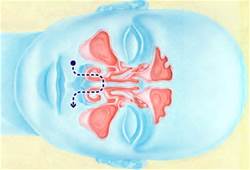Using nasal irrigation can seem intimidating, but it is a simple way to change your life for the better. Starting with irrigators like nasal sprays can help you to work your way up to methods like using neti pots. Now, how do these irrigators relieve your symptoms?
Most nasal irrigations systems use a saline concentrated solution to loosen and wash out bacteria. In addition, the solution will flush out the allergens and other particles that are lodged in your sinus cavities. As the solution moves through your sinus cavities, it will help to disinfect the passages, and then it will soothe the inflamed sinuses. The irrigation is also a great relief for allergies, as they rinse pollen and other allergens that you have breathed too deeply into your nasal cavities. While your nose may not be stuffy, the swelling causes nasal pain, congestion, headaches, and other symptoms.
It is true that nasal irrigators relieve your sinus and allergy symptoms; when used regularly they can also prevent other respiratory illnesses, too. When you use them nightly during periods when cold germs are circulating, it will be an effective deterrent for infections. Improvements happen immediately, but you can use them twice. However, it is important not to overuse nasal irrigation, as it will start to remove the good bacteria along with the bad.
What are the different types of irrigation?
Traditionally neti pots or bulb syringes are used in nasal irrigation. Today’s market has introduced a few more systems. These include sprays and steam inhalers. Each system comes with its own irrigation solution. Different irrigation methods will help, but may have varying degrees of effects.

What is in the irrigation solution?
It is important to note that while some solutions are homemade, you should not use tap water in your recipe. Even though tap water is safe to drink, it should not be put through your nasal cavity. Your digestive system is designed to fight off the nasty foreign elements that can come through. However, when you are cleaning your nasal cavity, you are bypassing the protections that are there. The force of the water pushes the invading particles out of your sinuses. If the water is not cleaned properly, then it can leave harmful agents causing their own infections. If you are not comfortable with preparing the solution properly, or you just don’t have the time, there are premade solutions for you to use.
If you are brave enough to attempt your own solution, consult your doctor before attempting your own solution to avoid any harmful missteps. Adding too much of the non-iodized salt will cause a burning sensation in your nasal cavities. Most solutions have a base consisting of distilled or boiled water; most add ¼ to ½ teaspoon of non-iodized salt and baking soda. There are medicated irrigations that will include topical antibiotics and steroids, but leave those to the professionals.
How do you use nasal irrigators?
The fluid is poured or sprayed in one nostril, and runs through the nasal cavities, sweeping the particles along and out through your other nostril. Remember to breathe through your mouth and not to tilt your head back. Please refer to Web MD’s slide show for a more detailed reference or to YouTube. After using these irrigators, it is important to sanitize them.

Are there other benefits to using nasal irrigators?
By using the natural irrigation regularly, you can decrease medicines you take to combat the symptoms that are a byproduct of these irritations. For example: headache medicines due to sinus swelling. In addition, you may feel an increase in your energy because your system is not constantly fighting off bacteria and other particles.
Natural solutions may not be your first choice, but many doctors will recommend trying irrigation to relieve sinus and allergy symptoms. Using nasal irrigation has proven results. So let yourself feel the relief from your stuffy nose and headaches without the grogginess that comes with prescriptions. You can prevent sinus infections and oncoming colds with these preventative measures.
